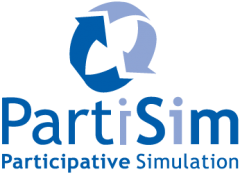Here we offer access to our dedicated toolset, which consists of the User Guide and the tools to support each PartiSim stage.
The User Guide provides an overview of the modelling process and outlines the activities and outcomes that should arise from each stage.
The tools can also be downloaded by following the links at the end of each section.
Stage 1: Initiate study
The PartiSim process invariably begins with at least a vague recognition that simulation modelling may help to address an organisational problem. A modeller or modelling team is commissioned, an initial feasibility check is undertaken, and timelines are agreed with the organisation. In short, this stage revolves around establishing the project management process by pursuing three fundamental objectives:
- Understand the situation of interest
- Identify stakeholders and roles
- Collect reading materials
Although the amount of preliminary work undertaken is a matter for the modelling team, it is normally advantageous to enter the workshop phases of the process with some preliminary outputs already developed. This helps to initiate discussion and saves time.
Stage 2: Define problem (workshop 1)
The overarching purpose of the first workshop is to arrive at a common high-level definition of the system being studied and gain an understanding of the problems and issues involved. The key objectives might usefully be broken down as follows:
- Develop a problem statement
- Define the system of interest
- Design a system model
This stage marks the first in which modellers and stakeholders work together in earnest. It is fundamental to achieving a shared understanding of the issues that need to be addressed and sets a tone of collaboration, confidence, communication, creativity and consensus.
Stage 3: Define model (workshop 2)
The aim of the second workshop is to specify the principal elements of the model – that is, to determine the project’s objectives and the required inputs, outputs and contents of the model. The process here can be divided into four mini-phases:
- Brainstorm the objectives
- Develop a performance measurement model
- Extract the objectives
- Develop a communicative model
In other words, this stage might begin with a simple question – “What do you hope to have achieved by the end of this project?” – and conclude with a solid idea of overall objectives and more specific requirements, including data needs and experimental factors.
Stage 4: Develop model
Using specialist simulation software or a programming language, the conceptual model should now be ready for conversion into a computer model. This non-workshop stage is driven mainly by the modeller, who should aim to fulfil the following tasks:
- Continue to liaise with the stakeholder team
- Collect and process all relevant data
- Present the model to the stakeholder champion in anticipation of stage 5
It is conceivable, of course, that organisational shifts and/or changes in stakeholder thinking could occur during this stage. Further conceptual modelling might therefore take place, resulting in additional modifications to the model defined in stages 2 and 3.
There are no specific tools and instructions for this stage, as we assume a simulation modeller is already involved as part of the modelling team.
Stage 5: Experiment with model (workshop 3)
The third workshop should follow the development of the model and an initial validation by the stakeholder champion. This clears the way for a live presentation of the model and its results to all stakeholders, with a view to achieving the following objectives:
- Validate the model
- Rate the performance measures
- Debate desirable and feasible solutions
This workshop should build confidence in the model and help stakeholders understand and imagine precisely how their problems might best be addressed. It is not unusual for stakeholders to request further scenarios in light of these discussions.
Stage 6: Implement findings (workshop 4)
The fourth workshop represents the final stage of the PartiSim process. Here the goal is to move stakeholders away from the model and its scenarios and towards identifying an action trail for change. The workshop should feature four structured sessions:
- Review learning
- Identify the changes already implemented
- Assess the risks and feasibility of change
- Determine an action trail
Here stakeholders are encouraged to take the final steps necessary to improve their systems. These steps are likely to include planning, setting deadlines and determining who should be responsible for which task. Progress updates should then follow.
